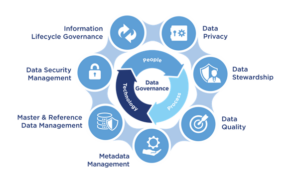Why can't we just get the data?
Why are there so many problems?
Why are you asking me so many questions???
These are three things that I get asked regularly by people throughout my organisation, from senior management to frontline workers. I often find myself daydreaming (about data, like any normal person) of the day when these questions stop, however that day isn’t today, it’s getting closer, but we aren't there yet! I'll share with you my thoughts on how to get there...
So, why can’t we just have the data?
Well, there's multiple reasons, which all mainly come down to how an organisation manages its data. This is a topic that I recently discussed with the ECC Data and Analytics team to highlight where we need to improve our own processes. In one exercise I asked the team what issues they face with sourcing and working with data. The answers were varied and complex, covering topics from quality, permissions, definitions, integration, and system changes, but they all fall under the umbrella of data governance.
Knowing that your organisation needs a robust data governance framework, and successfully implementing one, are two very different tasks though. Unless you are working with data day in day out, you may struggle to understand the importance of data management until you experience an issue that prevents you moving forward with a project. In addition, there is hidden work carried out by data engineers to keep everything working, or at least fixing things when they break (hopefully before anyone notices).
So how do we resolve these issues, reduce the ongoing maintenance, and ideally prevent them occurring in the first place?
By implementing a data governance framework!
Great, data governance is the answer can’t we just buy some new system to do that for us?
There isn’t a technology out there that will solve everything, but it is an enabler. The real value comes from creating processes with roles and responsibilities in place to ensure data is governed effectively.

I’m sure most people will have seen an image like the one above, maybe with slightly different wording, but they all highlight the critical parts of the data governance lifecycle.
Data stewardship: Data stewards do the day-to-day work of administering the enterprise’s data. Ensuring that practice and policies are adhered to. These people know systems inside and out and can help organisations identify changes to improve data integrity.
Data quality: Proactive management of the quality of data within the organisation. We all know there are data quality problems and now is the time to fix, not work around them.
Metadata management: A formal process of defining and documenting data assets across the enterprise. The data about data, which helps an organisation understand what information is held in the systems.
Master and reference data management: An enterprise management of agreed upon data elements that are critical and shared across data systems.
Data security management: A defined, and documented inventory of what data needs to be secured, who can access it, and how to secure it.
Data privacy: Information privacy is a vital area of risk identification and management. New legislation requires organisations to assess compliance efforts in handling customer data.
Information lifecycle governance: The management of data/information from creation to disposition. It establishes enterprise standards, policies and procedures for data retention and destruction.
So where do we start?
Start small and celebrate success! For those people who will be involved in data governance it may feel like a daunting task so it's important to start small. You are not going to solve the organisation's data governance issues overnight, so focus on an area that has a demonstrable impact. Work with stakeholders to show them the improvements and how you can remove those ever-present barriers, and they will become your data governance advocates for the next challenge.
For those people actively working on the tasks, make sure this is highlighted throughout the organisation and don’t hide this work away like organisations tend to do. This work is important, and the project needs visibility, so i becomes part of the organisational consciousness.
Develop communication routes and be as transparent as possible, show progress, highlight issues, and keep people up to date. The more people are exposed to data governance and risks the less reluctant they are to engage.
As with any project decide how you will measure success and create metrics to monitor progress, without this how will you know how well your data governance practices are performing.
Our journey is just starting and it’s not going to be easy, but if you are anything like me I would rather be looking at new challenges than repeatedly fixing the same problems over and over again. Join us on the data governance revolution and we will report back our progress over the coming year.